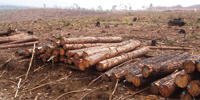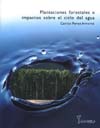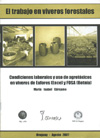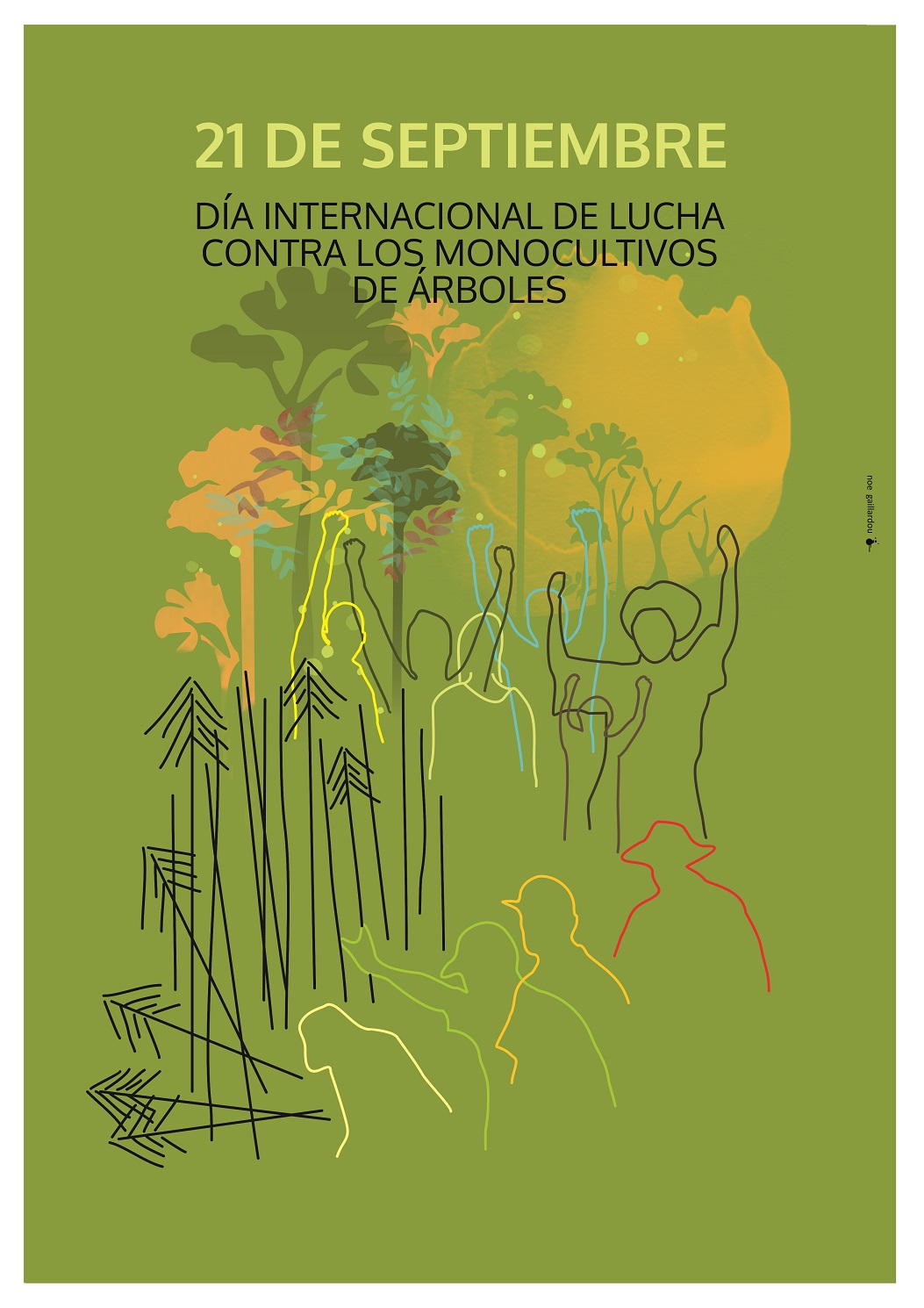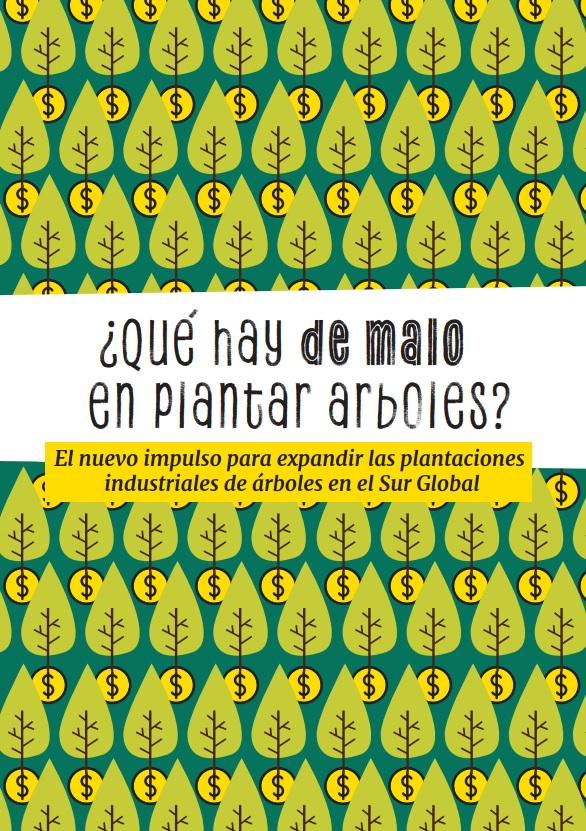As we reported in October 2009, the Korean steel company POSCO has been granted the opportunity both in India and in Uruguay to occupy territory that is valued by the inhabitants of both countries.
In India, POSCO was granted permits to install a steel plant and a port and also to carry out mining prospection in the eastern state of Orissa in an area which includes 6000 hectares of pristine forests, prime agricultural land and coastal economy. On its part, the Uruguayan government signed an Investment Promotion and Protection Agreement with the Korean government, whereby all type of support is guaranteed to the Korean firm POSCO to establish a “Carbon sink Forestation Project” ( See details in WRM Bulletin No. 147 )
The only reason why the project in India has not yet been implemented is because of the massive resistance since 2005, involving thousands of people who depend for their survival on the forests, agricultural land and sea-coast the company plans to destroy for its business. According to recent reports, due to the lack of response on the part of the government and in protest against what the locals call the joint conspiracy by the central government at Delhi, the state government and the South Korean President, the inhabitants decided to continue with their “Sit-in” ( Dharna in the local language), a peaceful protest that started on 26 January 2010 (coinciding India’s Republic Day in which the Korean President was official chief guest). One hundred and seven days and nights had gone by, during which women, men and children of farm and fisherfolk families sat in, when they decided to appeal for national and international solidarity as they had been unable to achieve the slightest sense of government responsibility towards the people they are supposed to represent.
In a desperate effort to comply with the promise to “expedite works to hand over lands,” to the company, on 11 May this year the government sent 25 strongly armed military squads, which surrounded the area where the inhabitants were carrying out the sit-in, occupying schools and prepared to attack … the local unarmed population. In this framework, the anti-POSCO movement made a further urgent appeal to participate in the Massive Resistance Week in solidarity with the local strugglers against the giant POSCO and against State brutality.
“At no point, in their struggle for over five years, have the anti-POSCO protestors indulged in any violent activities and have instead set an example to the rest of the country on how to carry out a democratic struggle based solely on the mass support of ordinary men and women” says the movement in their press release. In spite of this, on May 15, Orissa police opened fire on peaceful protesters who stood on the way in defense of their lands and livelihoods. This act of the state was condemned by various human and civil rights organisations across the country and the world. Forest-rights movement groups such as the National Forum of Forest People and Forest Workers (NFFPFW) and the Campaign for Survival and Dignity (CSD) condemned this atrocious brutality and the desperate attempt of corporatisation of forest resources, in which more than 50 people were injured severely and many shops and houses were set on fire by the blood-thirsty policemen.
Despite all the violence against the people and bullets lodged in their bodies, people in the area continue to protest against the acquisition of land for the steel plant and captive port. They are still there because this is not just a “dispute over land acquisition for development” as it has been announced by the government but because POSCO project is illegal and will not bring any benefits for the local population or the country’s economy. The POSCO project is illegal as it violates the Forest Rights Act of 2006. Under that law, no forest land can be given to anyone until: 1) all the rights of the people in the area are recognised and 2) their consent is given to the project. The Central and State governments have no legal right to hand over this land to POSCO. In law, not just in public view, this is daylight robbery of the country’s natural resources by a multinational. What is not usually mentioned is that POSCO is getting a huge amount of land, water and millions of tonnes of iron ore in exchange for which it will pay essentially nothing. This is what India’s government considers “development”.
On June 22, the POSCO–Orissa government Memorandum of Understanding (MoU) was set to expire, exactly five years after it was first signed. This MoU, which basically restricts the government’s role to that of a mere “facilitator” for the project and an agency for land acquisition, is highly unethical and should not have been signed in the first place. Five years later, having witnessing the state’s brutal repression of the local opposition to this project, and how the state has repeatedly flouted its own laws and policies regarding forest rights and enviromental protections, local people demand that this MoU not be renewed and request support by signing the petition available at: http://www.petitiononline.com/p210610/petition-sign.html
This same company also disembarked in Uruguay with a project for “clean development” involving monoculture tree plantation aimed at “compensating” for carbon dioxide emissions within the so (badly) called “Clean Development Mechanism” (CDM) of the UN Climate Change Convention. As to be expected, the company assures that its project implies “a significant contribution to the sustainable development of Uruguay.”
What is really sad is that the Uruguayan government has just given the green go-ahead to the POSCO project, in spite of the long track-record of opposition to monoculture tree plantations in this country and the enormous amount of documented information available regarding their social and environmental impacts. This decision has disregarded the document submitted by the Network of Environmental NGOs and by the Uruguayan Association of NGOs to the CDM Advisory Committee in Uruguay, in which the arguments used by the company to justify the so-called development associated with its project, are refuted one by one.
What is even more serious is that the government of Uruguay has not considered the level of conflict and repression that the presence of POSCO has caused in India over the past 5 years, clearly showing up the real nature of this company that now intends to appropriate Uruguayan land under the mask of “clean development.”
The lack of respect for the right of the peoples over their lands and forests in India, the lack of consideration for the well established social and environmental impacts caused by monoculture tree plantations in Uruguay, are disastrous for either country, and even worse for the climate.
Article based on information from the Appeal of the anti POSCO Movement (PPSS), and the Press Releases of May 15 and June 6 sent by Mamata Dash, e-mail: mamata68@gmail.com
Source: WRM’s bulletin Nº 155, June 2010


